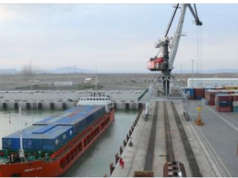Trend: The new regulation on gas supply security of Europe and the progress of the Southern Gas Corridor show that the EU is moving forward as far as its energy policies are concerned, Francis Perrin, energy expert, chairman of Energy Strategies and Policies (France) told Trend.
He pointed out that a key dimension of the Energy Union is greater diversification. Diversification is a global concept which includes diversification of supplying countries, supplying companies, routes, transport modes (gas transported by pipelines and liquefied natural gas) and energies (natural gas, renewable energies, nuclear energy, etc.), added the expert.
“The future opening of the Southern Gas Corridor with gas coming soon (2020) from the Shah Deniz field off Azerbaijan will be a very good achievement in this respect as it will be the first direct gas link between the Caspian Sea region and the European Union. This project is clearly in line with the goals of the Energy Union,” said Perrin.
Cyril Widdershoven, a Middle East geopolitical specialist and energy analyst, a partner at Dutch risk consultancy VEROCY and SVP MEA-Risk, told Trend that Europe’s current approach towards enhancing solidarity internally should be supported by a European foreign energy policy, to increase and enhance supply options (also invest abroad).
Southern Gas Corridor is one option that has been taken in, he added.
The European Parliament has endorsed new gas security supply rules in Europe. The new rules will put solidarity first when it comes to dealing with disruptions to gas supply,
Perrin noted that the approval by the European Parliament of the new gas supply security regulation is an important step forward for the European Union as it is a key part of a more comprehensive and very ambitious project called the Energy Union and presented at the beginning of 2015 by the European Commission.
“This new regulation will impose a principle of solidarity with a EU member country if its gas supplies are threatened. Solidarity is totally logical within the European Union but what should be obvious is not always obvious given the sometimes conflicting interests of various nation states. It is thus necessary to organize this solidarity and the new regulation represents a legal basis to do that,” he added.
Perrin pointed out that what is also very important in this gas supply regulation is that households and the main social services will be protected from gas supply disruptions and that neighbouring countries will be involved in this solidarity towards the affected country.
Widdershoven for his part, noted that the new regulations that have been voted in and agreed upon will strengthen the EU’s collective security of energy supply approach.
“If put into action and followed by all, the effects will be visible, depending on the possible threats encountered. If however Russia (or a Russian related entity) would take a full boycot of gas deliveries to the EU, the act will be put under severe stress. Firstly because a total blockade of gas supplies by Russia would a too large volume loss to be addressed without getting into transportation difficulties in the European gas grid. Secondly, these volumes can only be mitigated partly, as there is not enough volumes in storage within the whole of the EU,” said the expert.
Widdershoven believes that main countries that are going to feel the effects, even after a full implementation of the new regulation, will be former Eastern European countries.
“Their current gas storage capacity is not yet at the needed levels and infrastructure to these regions is still in need of expansion (capacity). Thirdly, it all depends again in how far a real solidarity will be available between all member states in time of need. Looking at the current internal situation and immense existing differences between European countries with regards to European issues, energy security issues, solidarity and a one-Europe approach,” he added.
Solidarity is easy when all is clear and nothing is under stress, real solidarity is still question, and allegiances will change, the expert believes.
© Content from this site must be hyperlinked when used






